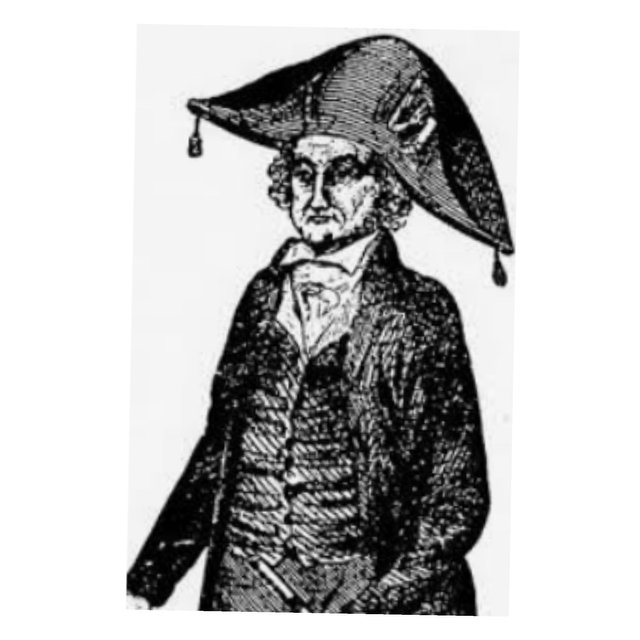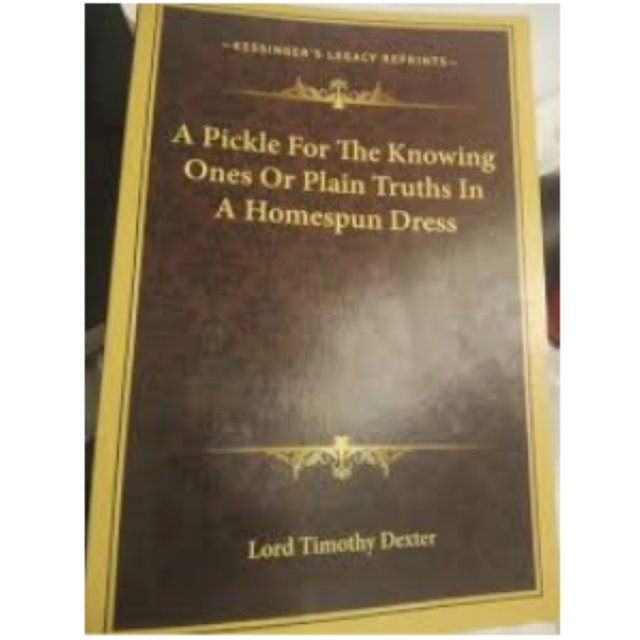Timothy Dexter a legend like no other
Hello guys today i will be sharing a life of one of my favorite legends Lord Timothy Dexter who made his life his own way I which may like foolishness to many.

Timothy Dexter was born on January 22, 1747, and was undoubtedly the most eccentric person of his time. He aspired to join the upper classes of society, as many a fortunate blockhead had done before him, but he could not keep his mouth shut, and made no headway in his attempted progress to join the aristocrats of Boston, which led him to turn his attention to Newburyport.
Dexter married a wealthy widow Elizabeth (Lord) Frothingham

and purchased a princely chateau commanding a most beautiful and extensive view of the sea and created rows of columns, fifteen feet, at least, high, on which to place colossal images carved in wood. Directly in front of the todoor stood general Washington in his military garb.
On his left hand was Jefferson, on his right, Adams. On the columns in the garden there were figures of Indian chiefs, military generals, philosophers, politicians and statesmen, now and then a goddess. Dexter put himself among the great he delighted to honor, labeled the column, “I am the greatest man in the East,” and proclaimed himself to be “Lord Timothy Dexter,” a title by which the amused public thenceforth called him.
Dexter was eccentric but not a fool. Everything that he undertook, worked well. He would inquire if any article was scarce in the market, and if so, he would buy up all he could find, and not infrequently raised the price of it to double or more.Shrewd merchants were suspicious of selling him an article, apprehensive that it was almost a sure sign that it was going to rise, although they could see no reason for it. He more than doubled his fortune by gathering Federal notes as an investment and selling them for a profit, and in doing so winning a wager that the United States would survive as a nation.
Lord Timothy Dexter, by every devise, was notorious, but not popular. He found that people did not always find respectability in proportion to their profusion. The men would not associate with him, the women shunned him, and the boys used him at times for their mirth. The story of his attempts at improper liberties with his female visitors diminished every day. When disappointed of his prey he would rave about house and curse his family for joining in the league against him.
Dexter wrote a book about himself titled, “A Pickle for the Knowing Ones,”

a collection of anything and everything that entered the head of this motley fool. He spelled as he wished, and left out all punctuation, putting them all in the last page, requesting the reader to place them where he pleased. In the book he declared himself “the greatest philosopher in the known world,” and hinted at the hoax that is the subject of this story:
“Ime the first Lord in the younited States of A mercary Now of Newburyport it is the voise of the people and I cant Help it and so Let it gone Now as I must be Lord there will foller many more Lords pretty soune for it Don’t hurt A Cat Nor the mouse Nor the son Nor the water Nor the Eare then goue on all is Easey Now bons broaken all is well all in Love Now I be gin to Lay the corner ston and the kee ston with grat Remembrence of my father Jorge Washington the grate herow 17 sentreys past before we found so good a father to his shildren and Now gone to Rest Now to shoue my Love to my father and grate Caricters I will shoue the world one of the grate Wonders of the world in 15 months.”
Lord Timothy Dexter believed that his name would go down to posterity in great honor, and that over his remains there would hang a permanent halo of glory. With this impression, he built himself a pleasant garden tomb and ordered a fine coffin, superbly lined and pillowed, and in which a living head might have rested comfortably. He took no small pleasure in showing it to his visitors.
Dexter set up a mock funeral (supposed by many at the time to be a real one) and bribed his family to acquiesce in his whim. Cards were sent to certain persons in the town to attend the funeral. Some who had no misgivings, and all who desired a frolic, came at the hour appointed. He could not get a priest, so he hired some wag to perform the burial service and deliver a eulogy and who sang a requiem that a bacchanalian had in former times composed for himself. The procession moved to the garden vault, the coffin was deposited, and the door was locked. The assembled mourners returned to the large hall, where a sumptuous entertainment had been provided, and the choicest wines were poured out like water.
From the kitchen came a horrendous noise, which was Dexter beating his wife for not appearing sorry enough about his “death,” and we can be sure that she certainly was not. Lord Dexter was otherwise pleased with his ruse and the excellence of his concealment, but having heard his praise by the drunken revelers, he burst into the wake-room with the highest glee, and shared in the wine. He expressed himself satisfied with everything but the absence of the tolling bell, and his wife’s dry eyes. His son had performed his part to admiration, being sufficiently drunk to weep without much effort.
In another episode, Dexter landed in the Ipswich jail after someone crossed him and he rushed to the house for a pistol, but his aim was so poor that he never hit anyone.
With books to read but no mind to read them, his wife long since fled from his home, his son half mad anme, his son half mad and his daughter wholly mad, Dexter feigned a feverish interest in public affairs of which he knew absolutely nothing, providing contemptuous amusement to everyone in town. The only public office he held was “informer of deer” which carried the duty of arousing the town when deer were seen in the vicinity, but no deer ever ventured near during his term.
Lord Timothy Dexter continued his course of life, without any essential change of habits, until October 26, 1806, when he quietly expired at his palace. The town did not allow his remains to repose in the tomb he made for himself, and he sleeps quietly in the Hill cemetery in Newburyport. A simple stone marks the grave of the once ambitious fortunate whose living dreams were full of posthumous glories.
Dexter’s house became a hotel, and storms destroyed his statues, but his “littel book,” his tombstone and a volume of stories about him keep his story very much alive today.
Lord Timothy Dexter of Newburyport was not really a lord; he bestowed that title upon himself. His home was a showplace, ornamented in front by wooden statues of himself and prominent men of the day, the early 1800’s. The belvedere on the roof with an eagle for a finial was a lovely ornament atop the large three story Georgian house built circa 1770
Lord Timothy Dexter’s house at 201 High Street in Newburyport
Tragedy struck this house on August 15, 1988 when house painters did the unthinkable. They used torches to burn off paint under the eaves. You can imagine the rest. The house went up in flames, the beautiful belvedere crashed down through the house. Had it not been for its rich history and the existing plans would it have been saved? The front page of the Newburyport News claimed the loss was $1,000,000, but it was rebuilt and to all appearances looks the same as always on the exterior.
The stories of Lord Timothy Dexter are kept alive in Newburyport and throughout New England. Lord Timothy Dexter’s stately house remains as always, the Buckingham Palace of Newburyport.
You've got a free upvote from witness fuli.
Peace & Love!
✌️